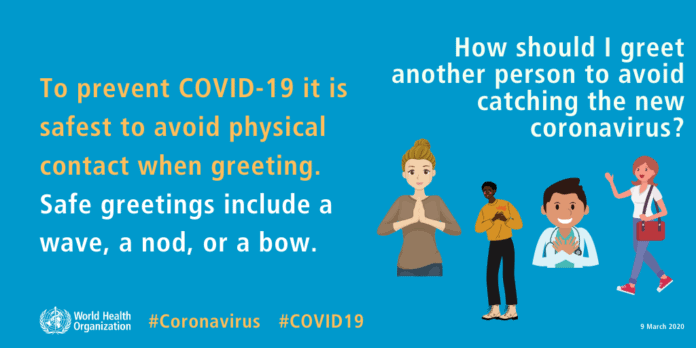DALLAS – As the World Health Organization (WHO) numbers increase daily, social distancing (that means being no closer than six feet to another person) and quarantining have never been more important to understand.
As of March 20, WHO reported 209,839 cases confirmed globally and of those 16,556 cases were within the last 24 hours. Of that number there were 8,778 deaths reported globally with 828 deaths in the last 24 hours.
The pandemic is real.
The precautions we are being asked to take are real, even if it is destroying our nation’s economy now.
In the Region of the Americas 9,144 cases were confirmed with 4,166 in the past 24 hours and 119 deaths overall, with 50 being reported in the last 24 hours.
On a local level in Texas there are 264 cases as of Thursday with four deaths in the state.
Broken down in the FDN readership counties that is 55 cases in Dallas with one death, one case in Ellis County with no deaths, 19 cases in Tarrant County with one death and one case in Johnson County with no deaths reported.
In a press conference earlier this week Dallas County Judge Clay Jenkins warned and strongly advised for residents to stay at home if they could. Otherwise he stressed the words again, social distancing.
“We must replace selfishness with sacrifice if we are to protect our seniors and most vulnerable amongst us. Don’t give into fear, rather have faith in the science, the science that will be your road map to keeping you and your family safe,” Judge Jenkins said. “Replace panic with prayer and personal responsibility. We can do this North Texas, but it takes all of us. The life you save may be your Nana’s.”
Part of saving lives is indeed social distancing – if you must go out. But what is social distancing? According to Jenkins’ press conference notes here are some guidelines to follow as outlined by the Dallas County Health and Human Services.
- Be aware of the city’s vulnerable populations, which include people 60 years old and older and people with certain health conditions such as heart disease, lung disease, diabetes, kidney disease and weakened immune systems. For those listed in the vulnerable population category don’t go to gatherings unless it is essential. If you can telecommute, you should. Avoid people who are sick.
- For workplace and business situations minimize exposure. This also means to suspend nonessential employee travel, minimize the number of employees working within six feet of one another, including minimizing or canceling large in-person meetings and conferences. Urge employees to stay home when they are sick and maximize flexibility in sick leave benefits, do not require a doctor’s note for employees who are sick, consider use of telecommuting options, some people need to be at work to provide essential services of great benefit to the community – in this case, take steps in the workplace to minimize risk.
- Cancel all non-essential events and do not attend any events or gatherings if sick. For events that aren’t cancelled, the DCHHS recommends having hand washing capabilities, hand sanitizers and tissues available and frequently clean high touch surface areas like counter tops and handrails. Also, find ways to create physical space to minimize close contact as much as possible.
- For schools it is safety first. Schools have been temporarily closed, but when schools are opened again do not have your child attend school if sick. If you have a child with chronic health conditions, consult the child’s doctor about school attendance. Schools should equip all classrooms with hand sanitizers and tissues, and it is recommended to reschedule or cancel events that are not essential. Explore remote teaching and online options to continue learning. Schools should develop a plan for citywide school closures, which we are already experiencing.
- Public transit is still vital for some residents. In this case the facility should be kept clean to protect all residents and workers. It is important to increase cleaning of vehicles and high touch surface areas while also providing hand washing/hand sanitizers and tissues in stations and on vehicles.
- In health care facilities avoid these locations if possible, in order to protect the vulnerable. For long-term care facilities a COVID-19 plan in accordance with CDC or state guidelines should be put in place. Long-term care facilities should restrict all visitation except for certain compassionate care situations, such as end of life situations. The general public should avoid going to medical settings such as hospitals, nursing homes and long-term care facilities, even if you are not ill. If you are ill, call your healthcare provider ahead of time, and you may be able to be served by phone. Do not visit emergency rooms unless it is essential and follow the guidance and directions of all facilities.
- It is essential that everyone does their part. The best way for all Dallas County residents to reduce their risk of getting sick, as with seasonal colds or the flu, still applies to prevent COVID-19. Wash hands with soap and water for at least 20 seconds, cough or sneeze into your elbow or a tissue, throw the tissue in the trash, stay home if you are sick, avoid touching your face, try alternatives to shaking hands, like an elbow bump or wave. If you have recently returned from a country, state or region with ongoing COVID-19 infections, monitor your health and follow the instructions of public health officials and CDC guidance. There is no recommendation to wear masks currently to prevent yourself from getting sick.
Follow Focus Daily News to get up-to-the-minute information in this ever-changing environment resulting from Covid-19.















